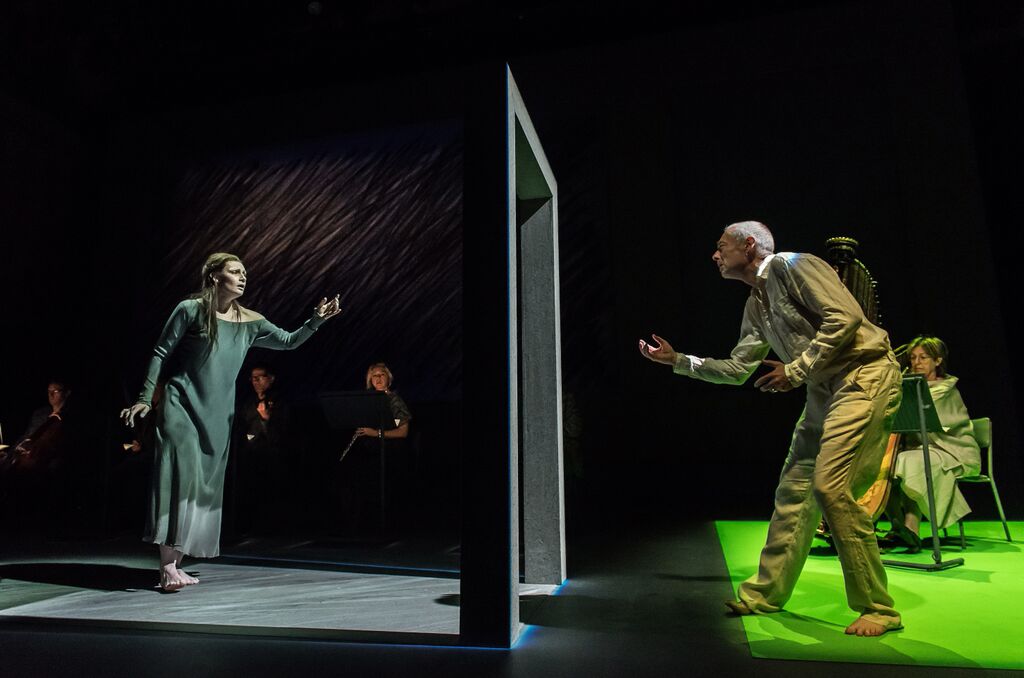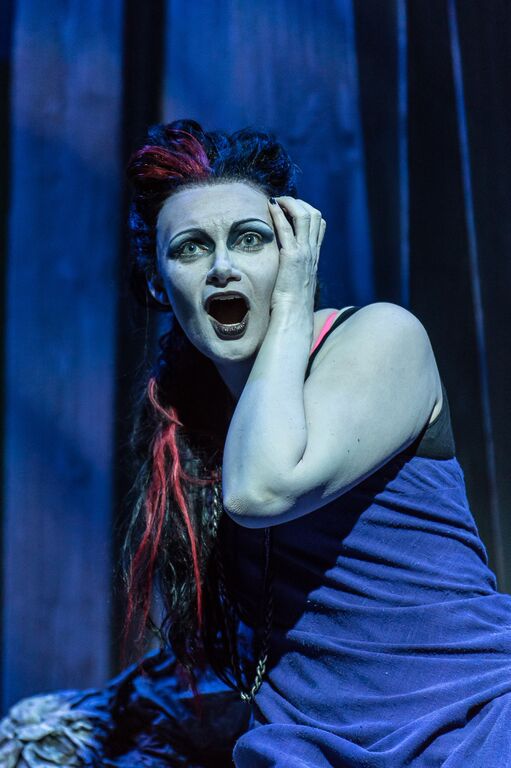The Corridor/The Cure, Linbury Studio Theatre | reviews, news & interviews
The Corridor/The Cure, Linbury Studio Theatre
The Corridor/The Cure, Linbury Studio Theatre
A beguiling evening of music-theatre pairs old and new

Thresholds are breached and barred, penetrated and sealed up in Harrison Birtwistle’s beguiling pair of mythological scenas The Corridor and The Cure.
The Corridor remains an extraordinary piece of music-theatre. Birtwistle demands that its six instrumentalists (flute, clarinet, string trio and harp, played here by members of the London Sinfonietta) are integrated physically into the action, both agents and spectators in the terrible intimacy of Orpheus and Eurydice’s final encounter, “dancing” her back down into the darkness. Directing our ears with movement and clever spatial staging, director Martin Duncan here encourages his audience to hear Birtwistle's vocal and instrumental textures as the continuum they are, each enacting as well as narrating.
 The corridor of the title is not only the pathway from the Underworld but also the dramatic structure of this miniature. A familiar tale is focused and narrowed, restricted to a slim passageway of musical narrative that starts and ends right at the heart of the myth – the moment of Orpheus’s disobedience. Alison Chitty’s designs reflect this narrow intensity, saturating the small stage space with deep colours and angular shapes.
The corridor of the title is not only the pathway from the Underworld but also the dramatic structure of this miniature. A familiar tale is focused and narrowed, restricted to a slim passageway of musical narrative that starts and ends right at the heart of the myth – the moment of Orpheus’s disobedience. Alison Chitty’s designs reflect this narrow intensity, saturating the small stage space with deep colours and angular shapes.
The effect is striking, a charged frame for two outstanding central performances. Mark Padmore (Orpheus, pictured above right with Atherton) finds and risks all vocal colours in inhabiting Birtwistle’s lines, mining David Harsent’s quietly lovely libretto for emotion. But it is Elizabeth Atherton (pictured below), here as Eurydice and later as Medea, who dominates. Urgent and absolute, where Orpheus is all song, she is rational spoken thought, interrogating rather than affirming: “This perfect love, this perfect match – do you believe in it?”
 Atherton’s intelligent musicianship is the pathway through Birtwistle’s drama, dense with textural interest. But where The Corridor offers the soprano a weighty partner and counterbalance in Orpheus, The Cure dilutes its impact, splitting Padmore between the twin roles of Jason and his father Aeson. The symbolism is neat in this twisted love-triangle, but dramatically it feels fractured, forced, at times. The Cure seems like an operatic monologue with interpolations rather than the two-hander that it needs and wants to be.
Atherton’s intelligent musicianship is the pathway through Birtwistle’s drama, dense with textural interest. But where The Corridor offers the soprano a weighty partner and counterbalance in Orpheus, The Cure dilutes its impact, splitting Padmore between the twin roles of Jason and his father Aeson. The symbolism is neat in this twisted love-triangle, but dramatically it feels fractured, forced, at times. The Cure seems like an operatic monologue with interpolations rather than the two-hander that it needs and wants to be.
Conductor Geoffrey Paterson balances his forces beautifully, transforming the Sinfonietta’s solo voices in The Corridor into the meshed orchestral sound of The Cure, stressing both the similarities and the contrasts of two scores luminous with harmonic interest and shy gestures of melody.
If The Corridor is unquestionably the stronger, the more distilled, of the two pieces, this new pairing opens a satisfying musical conversation. The Corridor and The Cure are variations on a mythological theme, revealing human truths with as much delicacy and poignancy as any stage work Birtwistle has yet produced.
rating
Explore topics
Share this article
The future of Arts Journalism
You can stop theartsdesk.com closing!
We urgently need financing to survive. Our fundraising drive has thus far raised £49,000 but we need to reach £100,000 or we will be forced to close. Please contribute here: https://gofund.me/c3f6033d
And if you can forward this information to anyone who might assist, we’d be grateful.

Subscribe to theartsdesk.com
Thank you for continuing to read our work on theartsdesk.com. For unlimited access to every article in its entirety, including our archive of more than 15,000 pieces, we're asking for £5 per month or £40 per year. We feel it's a very good deal, and hope you do too.
To take a subscription now simply click here.
And if you're looking for that extra gift for a friend or family member, why not treat them to a theartsdesk.com gift subscription?
more Opera
 Orpheus and Eurydice, Opera Queensland/SCO, Edinburgh International Festival 2025 review - dazzling, but distracting
Eye-popping acrobatics don’t always assist in Gluck’s quest for operatic truth
Orpheus and Eurydice, Opera Queensland/SCO, Edinburgh International Festival 2025 review - dazzling, but distracting
Eye-popping acrobatics don’t always assist in Gluck’s quest for operatic truth
 MARS, Irish National Opera review - silly space oddity with fun stretches
Cast, orchestra and production give Jennifer Walshe’s bold collage their all
MARS, Irish National Opera review - silly space oddity with fun stretches
Cast, orchestra and production give Jennifer Walshe’s bold collage their all
 Káťa Kabanová, Glyndebourne review - emotional concentration in a salle modulable
Janáček superbly done through or in spite of the symbolism
Káťa Kabanová, Glyndebourne review - emotional concentration in a salle modulable
Janáček superbly done through or in spite of the symbolism
 Buxton International Festival 2025 review - a lavish offering of smaller-scale work
Allison Cook stands out in a fascinating integrated double bill of Bernstein and Poulenc
Buxton International Festival 2025 review - a lavish offering of smaller-scale work
Allison Cook stands out in a fascinating integrated double bill of Bernstein and Poulenc
 Tosca, Clonter Opera review - beauty and integrity in miniature
Happy surprises and a convincing interpretation of Puccini for today
Tosca, Clonter Opera review - beauty and integrity in miniature
Happy surprises and a convincing interpretation of Puccini for today
 Hamlet, Buxton International Festival review - how to re-imagine re-imagined Shakespeare
Music comes first in very 19th century, very Romantic, very French operatic creation
Hamlet, Buxton International Festival review - how to re-imagine re-imagined Shakespeare
Music comes first in very 19th century, very Romantic, very French operatic creation
 Falstaff, Glyndebourne review - knockabout and nostalgia in postwar Windsor
A fat knight to remember, and snappy stagecraft, overcome some tedious waits
Falstaff, Glyndebourne review - knockabout and nostalgia in postwar Windsor
A fat knight to remember, and snappy stagecraft, overcome some tedious waits
 Salome, LSO, Pappano, Barbican review - a partnership in a million
Asmik Grigorian is vocal perfection in league with a great conductor and orchestra
Salome, LSO, Pappano, Barbican review - a partnership in a million
Asmik Grigorian is vocal perfection in league with a great conductor and orchestra
 Semele, Royal Opera review - unholy smoke
Style comes and goes in a justifiably dark treatment of Handelian myth
Semele, Royal Opera review - unholy smoke
Style comes and goes in a justifiably dark treatment of Handelian myth
 Le nozze di Figaro, Glyndebourne review - perceptive humanity in period setting
Mostly glorious cast, sharp ideas, fussy conducting
Le nozze di Figaro, Glyndebourne review - perceptive humanity in period setting
Mostly glorious cast, sharp ideas, fussy conducting
 Fidelio, Garsington Opera review - a battle of sunshine and shadows
Intimacy yields to spectacle as Beethoven's light of freedom triumphs
Fidelio, Garsington Opera review - a battle of sunshine and shadows
Intimacy yields to spectacle as Beethoven's light of freedom triumphs
 Dangerous Matter, RNCM, Manchester review - opera meets science in an 18th century tale
Big doses of history and didaction are injected into 50 minutes of music theatre
Dangerous Matter, RNCM, Manchester review - opera meets science in an 18th century tale
Big doses of history and didaction are injected into 50 minutes of music theatre

Add comment